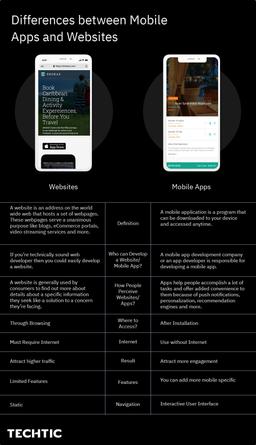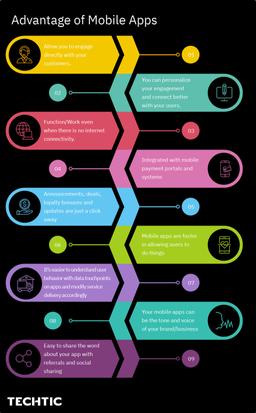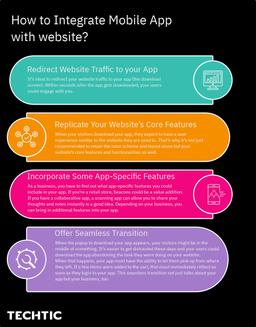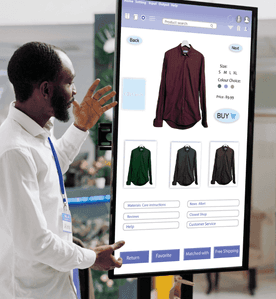Mobile App and Website Integration in 4 Steps
Sector: Digital Product, Technology
Author: Shreyansh Shah
Date Published: 05/04/2020

Contents
The world is becoming very specific by the day. Both companies and customers know what they want, how they want, and how to deliver/consume. As requirements become more niche, conventional methods of content consumption either adopt something entirely new or what’s trending at a particular point of time or attempt to bridge the gap between what’s lacking and what’s required.
As the world continuously moves from using websites to apps, the transition is still in process with some still preferring websites on their portable devices. This has led to the rise of mobile hybrid websites that look and feel like mobile apps but are still websites.
However, there are still users and companies who brainstorm and make new attempts at integrating their websites with their mobile apps.
If you’re someone who is looking for credible information on how you could integrate a mobile app with a website, you’re in the right place.
Recent researches show us that user spent their 90% of mobile time in apps, and spent only 10% of time in browsing the rest of the internet. When we talk about eCommerce space, mobile app users spend an average 201.8 minutes per month shopping, compared to 10.9 minutes/month for website users.
But before we find out how, let’s understand the differences.
Differences between Mobile Apps and Websites

Websites
For the uninitiated, a website is an address on the world wide web that hosts a set of web pages. These webpages serve a unanimous purpose like blogs, eCommerce portals, video streaming services, and more. Visitors can find the information posted by the website owner/business.
A Mobile App
A mobile application is a program that can be downloaded to your device and accessed anytime. These programs are not accessed within a browser but come with their own aesthetically designed interfaces and experiences.
Who can Develop a Website?
If you’re technically sound, you could develop a website. With continuous progress happening online, a web development company could do a better job at developing your website depending on your purpose or you could hire a web developer. If it’s a blog, the approach is different and if it’s a business website, the approach is completely different.
Who can Develop a Mobile App?
A mobile app development company or a mobile app developer is responsible for developing a mobile app. As we said, there are tons of frameworks and advancements in mobile app development today. Depending on your app idea, the developer would decide what approach works best and implement the necessary app development cycles and development protocols.
How do People perceive Websites?
Despite serving similar purposes, people perceive websites and apps differently. A website is generally used by consumers to find out more about details about specific information they seek like a solution to a concern they’re facing. Customers access websites to fill in forms to get callbacks, find out pricing, compare features and products and do more.
How do People perceive Mobile Apps?
Apps, on the other hand, are used extensively by customers. It’s where engagements happen. Apps help people accomplish a lot of tasks and offer added convenience to them because of push notifications, personalization, recommendation engines, and more. Though websites may attract higher traffic, it’s only apps that attract more engagement.
Advantage of Mobile Apps

When it comes to usability and user experience, apps definitely have an upper hand. They offer far more features and flexibility in executing tasks and getting things done. If you think you can manage with just a website (responsive or a mobile website), you’re wrong.
Here are some crucial reasons why mobile apps are inevitable for small-mid scale businesses.
- Mobile apps allow you to engage directly with your customers.
- You can personalize your engagement and connect better with your users.
- Mobile apps can function even when there is no internet connectivity.
- They can be integrated with mobile payment portals and systems.
- Announcements, deals, loyalty bonuses, and updates are just a click away.
- Mobile apps are faster in allowing users to do things.
- It’s easier to understand user behavior with data touchpoints on apps and modify service delivery accordingly.
- Your mobile apps can be the tone and voice of your brand/business.
- It’s easier to share the word about your app with referrals and social sharing.
How to Integrate Mobile App with Website?

As a business, I personally believe that we should appear in front of our customers and potential users in any way we could. Restricting ourselves to just one medium is only further narrowing down our scope or avenue to get more clients. That’s why I recommend integrating your website with a mobile app.
If you’re curious, this is how you do it.
1. Redirect Website Traffic to your App
If you’ve ever used the mobile website version of Facebook, you would have noticed that it consistently throws a link to download the app. While the website looks and functions like an app, there is still a gap in experiencing Facebook’s full potential. Even the website version of Instagram lacks the punch.
That’s why it’s ideal to redirect your website traffic to your app (the download screen). Within seconds after the app gets downloaded, your users could engage with you.
However, the catch here is how you convey the redirect and push your app. Do you intend to lock a few features on your website? Or, do you intend to rely on the power of copy to convince visitors?
2. Replicate your Website’s Core Features
When your visitors download your app, they expect to have a user experience similar to the website they are used to. That’s why it’s not just recommended to retain the color scheme and layout alone but your website’s core features and functionalities as well. When you integrate your mobile app with a website, neither should eclipse the functionalities of the other, making people wonder about the differences in user experience.
3. Incorporate Some App-Specific Features
Apps have the power to do more when compared to websites. By leveraging the potential of a device’s myriad of features, apps can get a lot more done. As a business, you have to find out what app-specific features you could include in your app. If you’re a retail store, beacons could be value addition. If you have a collaborative app, a scanning app that can allow you to share your thoughts and notes instantly is a good idea. Depending on your business, you can bring additional features into your app.
4. Offer Seamless Transition
When the popup to download your app appears, your visitors might be in the middle of something. It’s easier to get distracted these days and your users could download the app abandoning the task they were doing on your website.
When that happens, your app must have the ability to let them pick up from where they left. If a few items were added to the cart, that must immediately reflect as soon as they log in to your app. This seamless transition not just talks about your app but your business, too.
Bonus Tips: Mobile App Security Checklist for Developers

Wrapping Up
So, now you understand why mobile apps are better and how you could integrate your app with your website. If you already have an app developed, follow these steps. Or, if you’re someone starting and looking to hire mobile app developer, reach out to an expert like us.
We work with the best minds in the industry to develop an app that turns your ideas into revenues.
Latest Tech Insights!
Join our newsletter for the latest updates, tips, and trends.



